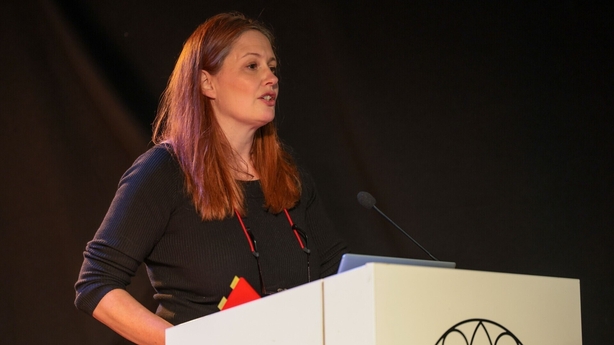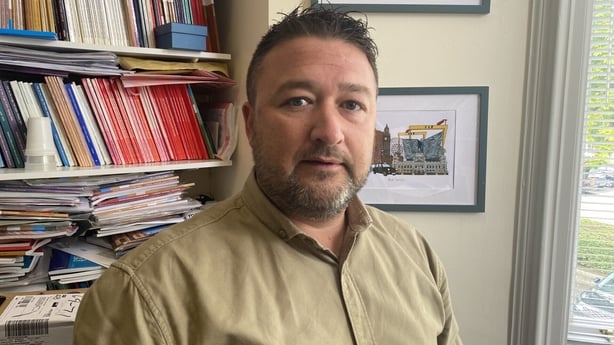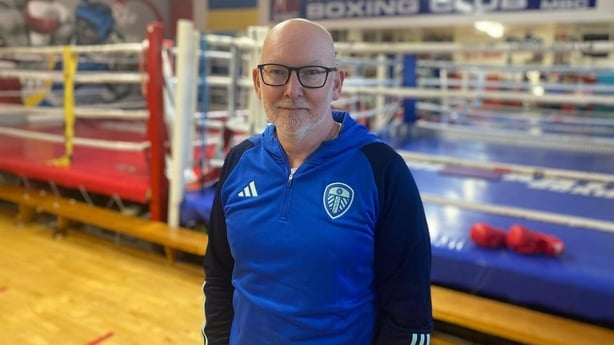Youth workers have said that paramilitary groups are "a major issue" in some communities in Northern Ireland, with young people suffering severe mental health issues, being forced into criminality or being "sexually exploited" if they do not hand over money to criminal gangs.
Earlier this year, officials from the Northern Ireland Department of Justice told a Stormont justice committee that they estimate 45% of young people in the North are impacted by paramilitaries.
A young man in the North told RTÉ of how he tried to take his own life after getting into drug debt to a paramilitary gang.
Danny, not his real name, said he grew up in a community "controlled by paramilitaries" and several of his friends were forced to join paramilitary groups and engage in criminal activity, or be shot in the legs if they could not pay a drug debt.
We need your consent to load this rte-player contentWe use rte-player to manage extra content that can set cookies on your device and collect data about your activity. Please review their details and accept them to load the content.Manage Preferences
Danny said drugs - marijuana, cocaine and prescription tablets - are controlled by paramilitaries in his area and it was "easier to get some drugs than it would be to get something in the shop at certain times of night".
He said he started on marijuana at the age of 16 and within two years was taking cocaine every day.
"I would have got it off the local drug dealers in my local community. Some are involved in paramilitaries, some are just by themselves. They'll have a link to the paramilitaries in my area," he said.
"If you're not in the paramilitaries and you're selling these drugs, you have to pay the paramilitaries a certain amount of money to be able to sell these drugs. And if you're not paying them a certain amount of money, then you have to join the organisation."
Danny said there are two main organisations in his community and to join you "go see a certain someone".
"Everyone's local and everyone knows each other, so you always know someone who's in these organisations. It's not a big secret.
"It's very easy - if they say do you want to join up, and you get took down the local club or the local bar and then that would be you sort of in with them.
"And then they'll have different ranks in these organisations. A lot of young people are coming in and they're just getting told to do the dirty work, so they'll be going out and doing the stuff these older men don't want it to. If it's wrecking cars or if it's beating people or if it's collecting money or it's selling drugs and stuff like that.
"So, because these men, they've got the money and they're selling all these drugs, they sit back and watch. And then the young generation sort of get roped into doing dirty work. I have some friends who've ended up in prison because of some activity they took part in.
"At the time they thought it was nothing because it was normal in our community to do this stuff day-to-day."
More: Our Lives in the North series
Danny said he would get drugs and be told he could pay the following week. He was able to pay some of the time, but says some of his friends who could not, and refused to join "the organisation" were shot in the legs or "took punishment beatings".
"They got taken down the local forest or they had been told to meet at a certain area and they'll be punishment beaten by baseball bats. And I've had friends who went to jail over the likes of getting caught with Class A or Class B drugs and stuff like that, you know. It's just an ongoing cycle."
At the beginning of this year, Danny had a £3,000 drug debt. He said he had "a bad spiral" and tried to take his own life. After being hospitalised, he told his family what had been going on. His family paid the money to the paramilitaries.
He said no one at any stage went to the police.
"They get a very bad reputation for certain things in the community, and if you're seen speaking to them, you're known as a tout. That's what people would call you. It could even be suddenly your name wrote over walls and stuff, or else it could be your house getting targeted by petrol bombs.
"Or maybe not just you. It could then be your family getting attacked. So people will try and avoid the police because they don't want to bring that drama to the door."
After his family paid off the paramilitaries, Danny became sober and said focusing on exercise and his work helped him stay on the right path. He cut himself off from certain acquaintances and sought out a "safe space" in his local youth club.
"The only two routes [are] death or prison"
He continued to get messages from the people who held the debt over his head, offering him drugs with no payment until the following week. They knew that Danny had tried to take his own life.
He changed his phone number but continues to see those people around his community.
"They can always try and rope you into these sort of things, but if you've got that right mindset and you're strong enough to say no, there's nothing they can do.
"So my aim is just to be proud and sort of spread the word for young people that there's more to life than being with these paramilitaries or taking these drugs, and that's what I like to represent.
"I escaped the cycle and got out of it. But a lot of young people never escape it. And the only two routes [are] death or prison."
'Wrecking their own communities'
Paramilitary is a contested term, with some commentators believing it risks lending an undeserved legitimacy to groups whose activities now resemble organised crime.
"Taking it back, maybe the 80s and stuff, when the paramilitaries were formed, maybe they wanted to keep their community protected," said Danny.
"Whereas now the paramilitaries in the community are just all drugs and money. They're wrecking their own communities.
"There could be a local business could start up and you get your own shop and they'll be straight down looking protection money. And the only thing you're paying for is for them not to burn you out.
"In my community, ever since the day I was born, it's just been the same. It's a normal thing. Like it's no secret. You know who's in these paramilitaries, you know what they're doing. They've got flags all around the place. They've got paintings on the walls and stuff.
"But no one can stand up and tell them not to do it."
The government in Northern Ireland has set up and funded a group called the Executive Programme on Paramilitarism and Organised Crime. The programme director, Adele Brown, told the Stormont justice committee earlier this year that 45% of young people are impacted by paramilitaries.
"There's a stereotype around about this, that this is men in balaclavas. And there is certainly an element of that in terms of paramilitary groups operating in Northern Ireland. But this is much broader," she said.
"It's about all the different types of paramilitary harm that exist within communities and that can range from really serious crime that might involve shootings or bombings or serious assaults, right the way through to coercive control within communities, illegal moneylending or in some cases, grooming and exploitation of young people."

Ms Brown said the groups have their roots in the Troubles but have evolved over decades into what looks similar organised crime in Dublin, Manchester, Glasgow or London. But, she says, the groups operating in Northern Ireland are distinct from elsewhere.
"What they have in many cases is still an emotional attachment within communities or in some cases, they can actually provide a sense of safety within some communities. That means that they can pull on that emotional baggage when they want to, and that sets them aside from what would typically be regarded as an organised crime group.
"So that ability to coerce and control within the community and to position themselves as protectors of that community, based on historical context, is something which sets them apart. And it's something which is very difficult, complex, and slow to unpick and something that we need to do working really closely with the communities."
Calls for communities to work with police
Danny said that everyone knows who the paramilitaries are. Supt Joanne Gibson from the Police Service of Northern Ireland said this does not always translate into intelligence coming to police.
"We want to obviously reduce the harm, but ultimately we want to get the people who are behind the criminality. And in order to do that, we really need communities to work with the police to give us that information and intelligence," she said.
"What we're constantly doing is try to increase trust and legitimacy in policing, particularly in communities where we know and understand that there is that lower level of trust and that obviously goes back a number of decades."
Colm Walsh, from Queen's University Belfast, researches the impact of paramilitaries on young people. He believes many people in the North may live unaware of the impact paramilitaries can still have, as it can be a highly localised problem.

"Paramilitarism is very clustered. It doesn't happen everywhere. Not everybody is affected, but it belies the fact that for many people in clusters of communities, this is a fact of everyday life. And if we don't pay attention to it, then those people in those communities will continue to be affected.
"But we also know that those clusters of harm have a ripple effect across wider society, so we need to pay attention to it."
In Monkstown Boxing Club in Antrim, Paul Johnston works on steering young people on a path away from paramilitary-related harm.
"There's a high increase of self-harm, suicide attempts and young people taking their own lives. Just last week, we had two attempted suicides within the community - young people younger than 24 years of age because of drug debt. So it's a major issue," he said.

"And then there's what actually happens if they can't afford to pay it back, what is their options? Again, many of them will be recruited into the gang. Some will be asked to hide some of the drugs within the house. In the worst case, some of the females involved will be sexually exploited as well."
Stephen Hughes is a youth worker at Saint Peters Immaculata in west Belfast.
"This year alone, we've had three people shot in the vicinity and 24 young people who have received threats."
Mr Hughes also said "everyone knows" who the paramilitaries are.
"But I think the legacy of the conflict is that we still enable and empower paramilitaries. Someone has to say this has to end and these people have to go away, and we have to try and embed some sort of normality into society where violence is not acceptable."
Our Lives in the North is a new six-part podcast series from RTÉ Radio 1, available on the RTÉ radio app or wherever you get your podcasts.
Listen: Episode 1 Health; Episode 2 Education







